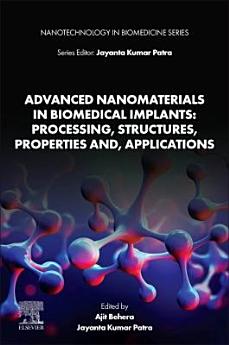Advanced Nanomaterials in Biomedical Implants: Processing, Structures, Properties and, Applications
Informacje o e-booku
O autorze
Dr. Ajit Behera is an Assistant Professor in the Metallurgical and Materials Department at the National Institute of Technology, India. He completed his Ph.D. from IIT-Kharagpur in 2016. Dr. Behera has received several prestigious awards, including the National "Yuva Rattan Award" in 2020, the "Young Faculty Award" in 2017, and the "C.V. Raman Award" in 2019. His research interests encompass smart materials, additive manufacturing, 3D & 4D printing, NiTi-alloys, plasma surface engineering, nanotechnology, magnetron-sputtered thin film, cryo-treatment, and the utilization of industrial waste. Dr. Behera has also contributed to the field with the publication of two patents related to smart materials.
Dr Jayanta Kumar Patra, MSc, PhD, PDF, is an Associate Professor at Dongguk University, Republic of Korea. He has around 14 years of research and teaching experience in the fields of pharmacology and nano-biotechnology. His current research focuses on nanoparticle synthesis by green technology methods and associated biomedical applications: green synthesis of silver, gold, iron, calcium, phosphorous nanoparticles using food waste, agricultural waste and plant materials and evaluation of their antibacterial, antioxidant and cytotoxicity potential. He also focuses on the antibacterial synergistic potential of nanoparticles and conjugation with different antibiotics, drugs etc. along with ethno-medicinal potential of plants. Dr Patra has published >150 articles in various national and international peer-reviewed journals, including Materials Science and Engineering C, Nanomedicine: Nanotechnology, Biology, and Medicine, International Journal of nanomedicine and Journal of Nanobiotechnology and around 35 book chapters. He is editor of 16 books covering nanotechnology in pharmacology, biomedicine and food sciences, including titles published with Apple Academic Press, CRC Press and Springer. He is currently also an editorial board member of >10 international journals, including BMC Complementary and Alternative Medicine, Frontiers in Nanotechnology, Frontiers in Cellular and Infection Microbiology, and Frontiers in Microbiology.






